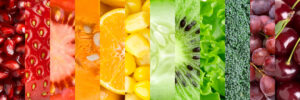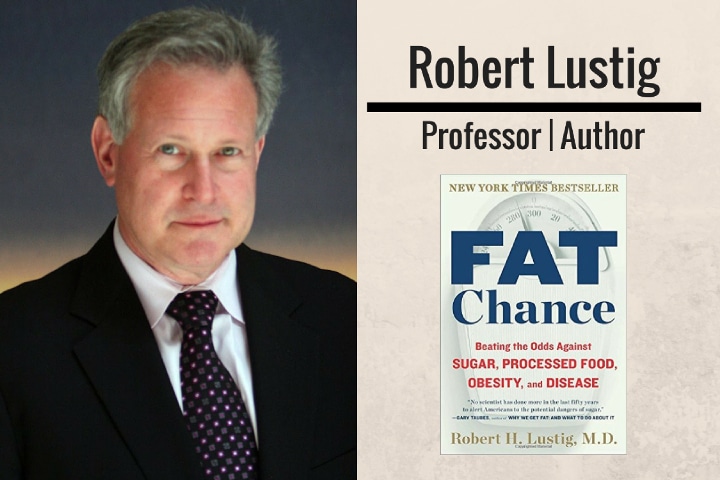I’m reading Dr. Robert Lustig’s 2012 book Fat Chance: Beating the Odds Against Sugar, Processed Food, Obesity, and Disease. I already knew sugar was toxic to the body, but here’s what this book taught me.
What We Individually Do
- Yes, our bodies run on glucose (sugar) and can’t survive without it. But our bodies create glucose from protein and fat molecules. We don’t need to consume much of it at all in the form of sweets and carbs.
- When we do consume sugar (including starchy carbs and alcohol), there’s a whole chain of reactions that happen and they include causing a lot of insulin to be released by the pancreas into the bloodstream. I knew the function of insulin was to turn sugar into fat, but I didn’t know too much insulin can block the brain from getting signals from leptin and this is a problem because leptin is the hormone that tells the brain that our stomach is full and it’s time to stop eating.
- Insulin resistance and leptin resistance are huge contributors to obesity.
- In the U.S., Blacks and Latinos are the biggest sugar consumers (I’m guessing that’s one of the effects of racism) and have the highest waist circumference, which is a marker for insulin resistance. Apparently we also have the highest risk for dementia.
Some Facts
- In 2012, when this book was published, the majority of people, regardless of weight, released double the insulin they did 30 years previously, even if they ate the same amount of sugars and starches. And there’s no reason to think things have gotten better.
- In 2012 there were 30% more obese people than undernourished ones on the planet. Today I can’t find how many more obese there are than undernourished, but the straight numbers are that in 2019 30% of all adults and children in the world were overweight. Almost one third of all the people in the world were overweight in 2019. Damn.
- A calorie is a calorie is a calorie? Nope. It matters if your snack is 150 calories of cookies or 150 calories of almonds or 150 calories of beer. Alcohol (ethanol) is a straight toxin and is more dangerous as a toxin than as the calories it contains. Sugar is also more dangerous than its calories. So go for the almonds.
- For the same number of calories, ethanol (alcohol) is more likely than glucose (sugar) to cause chronic disease.
- Nonalcoholic fatty liver disease (NAFLD) affects 45% of all American Latinos. That was in 2012, but there’s no reason to think this has improved. NAFLD can cause the liver to swell which can cause scarring (cirrhosis) and can lead to liver cancer or liver failure.
- Fruit juice has more sugar than soda.
What’s Beyond Individual Control
- Obesogens are chemicals (toxins) in our environment that increase our number of fat cells or promote fat storage in existing fat cells. We can do nothing about our exposure to these toxins because they’re in the air and water supply. They can also be part of the ingredients in things like bath gels and other skin care products.
- Excess estrogen causes weight gain, and chemicals that mimic the molecular structure of estrogen are in our food (for example, soy), plastics (for example, BPA) and water supply (for example, in the paint on the hulls of ships). This could be part of why even animals have been gaining weight in the past few decades. Yeah, they have.
- Another factor in having a big gut is cortisol. Cortisol causes extra fat to be stored in the gut, and the average stress levels of adults and children have been increasing in recent decades. That means even if you’re eating nothing but chicken breasts and steamed broccoli, if you also have stress in your life, your body is working to store fat in your abdomen as part of its physiological stress response. That gut fat is called visceral fat and it raises the risk of diabetes, heart disease, and other chronic problems.
- The reason health professionals say even a 5-10% loss in weight reduces chances of diabetes and other problems — no matter how fat you are — is that when the body loses weight, the first place it comes from is the visceral fat. And that’s the critical fat you need to lose to improve health.
- The other main fat is called subcutaneous fat and that’s what piles up on butts, hips, etc. Subcutaneous fat contributes much less to disease. In fact, it’s possible to lose your visceral fat, keep your subcutaneous fat and be pretty healthy. (So stop thinking badly of fat people. About 20% are perfectly healthy despite the wide bottoms.)
Why There’s Still Hope
- Exercising regularly is more important than being thin: Lustig cites a study of 38,000 American men that showed physical activity was more effective in preventing heart disease than being normal weight. So we should stop obsessing over how big we are and focus on health markers and add exercise (but I still obsess over how big I am).
- Moderate-intensity exercise for 15 minutes a day could be all it takes to improve your health enough to add three years to your lifespan. We don’t have to lift 150 pounds or run 5 miles a day (I also hear the 10,000 steps/day goal is more than is necessary).
- If you eat real food, your weight will take care of itself. But to be fully healthy, you must also exercise. There’s no substitute for it.
- Eat breakfast not just because it keeps you from getting hungrier later, but because it gets the body digesting food which takes energy (thermic effect). Skipping breakfast isn’t worth the calories it “saves.”
- FORGET ABOUT CALORIES. There are much more important ways food affects the body: chemically, hormonally and thermally. We hypnotize ourselves with calories so we think as long we keep calories low it’s okay to pour straight poison down our throats. Stop believing the lies about calories pushed by the food and diet industries.

Photo 43182049 © Seralexvi | Dreamstime.com
That’s what I learned from Dr. Lustig’s book. Here’s what the book confirmed for me:
- Obesity isn’t a disease. It’s a marker of deeper problems such as insulin sensitivity and metabolic syndrome. Saying obesity causes diabetes is like saying your sore throat caused your stuffy nose. (“Every time I get a sore throat my nose gets stuffy. I wish my throat would stop making my nose stuffy!”)
- Sugar and sweeteners are in almost every processed food and beverage there is, so either read every ingredient label to avoid that sugar or simply leave processed food out of your meals, snacks and beverages.
- It’s not enough to cut sugar. You also have to reduce “the whites” (my term, not Lustig’s) such as white bread, white rice, and pasta.
- Fiber, fiber, fiber. Sugar, or fructose, isn’t bad if it’s still part of its fiber-rich source. So eat the whole fruit. And eat “the browns” (my term, not Lustig’s): brown rice and other whole grains, nuts and legumes.
- Forget about sugar substitutes. Some have unpleasant side effects, plus they might affect gut flora and sugar cravings in unwanted ways. And, of course, we don’t know the long-term effects of these substitutes. The food industry isn’t going to do those studies unless someone makes them.
So, it comes down to:
People globally are fatter than ever and only some of the causes are within the control of the individual. We can’t personally change our water supply or the air we breathe or the feed used on livestock. That means even if you stick to meat, vegetables and fruit, you still get soy (which chemically causes weight gain) because that’s what livestock animals are fed (except for grass fed).
But we can undo/prevent a lot of damage to our bodies by sticking to real food, water and unsweetened (in any way) beverages. It’s definitely a mix of good and bad news. Dr. Robert Lustig offers no pleasant bedtime stories.
Lustig has written more recent books I haven’t gotten to. You can see them on his website. He also gives a lot of this information in various YouTube videos. He’s usually a guest on someone else’s channel, so if you want to hear him talk on these topics, search for his name.
30 June 2023




This article is so timely for me. I’m struggling with prediabetes even though my BMI is low. I’ve reduced my carbs drastically upped my exercise, but don’t see a major difference in my body size. I’m hoping the change is in the bloodwork next doc appointment. I wasn’t a junk food eater, but I guess even apples and oatmeal were too much.
Veronica, I’m glad I could help. Lustig confirms that exercise doesn’t cause weight loss; it “only” helps us get healthier. If you’ve drastically reduced sugar and carbs, you’ll probably see a difference in your blood work. I cut processed sugar 100% from my diet, drastically reduced carbs and didn’t add much exercise at all, but in 6 weeks my A1C went from 6.2 to 6.0. Very relieved! (I’ll increase exercise.)
What a useful summary. Thank you.
You’re welcome. Thanks for reading.